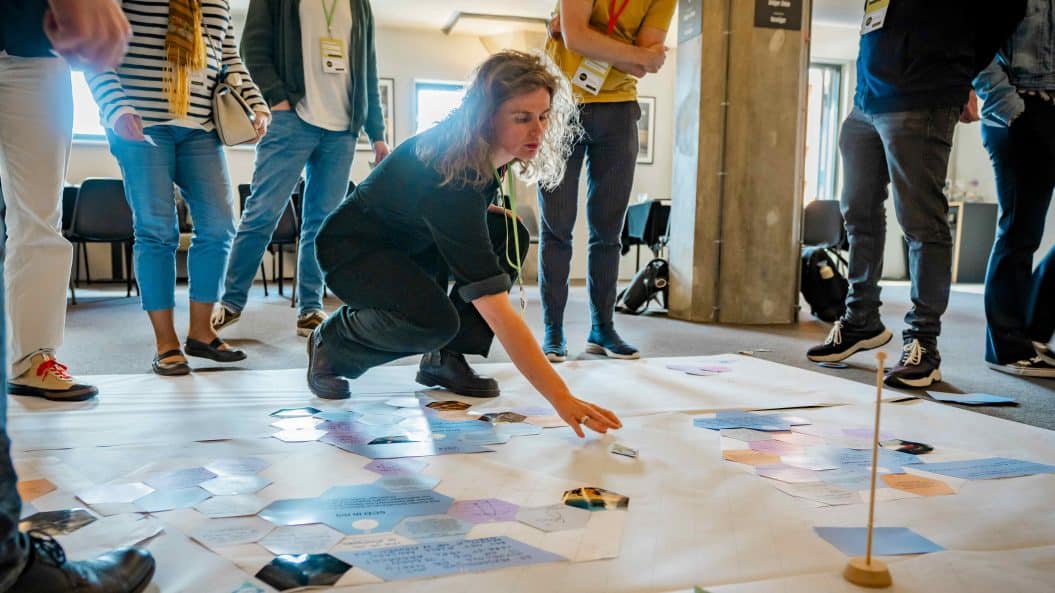Within ESCape, creative partners play an indispensable role. They are uniquely positioned to work in transition practices daily, and their experience and expertise are crucial for further developing the principles of Systemic Co-Design (SCD).
This spring, ESCape launched an open call for partners (referred to as the ESCall), who were awarded vouchers to provide them with time and support to reflect on their own approaches, tools, or methods and translate them into a shareable ‘knowledge product.’ This way, we help each other to further develop a broad arsenal of expertise, tools, and methods in SCD.
The awarded vouchers at a glance:
PerfectStorm, Keimpe de Heer
Systemic wind tunnel co-design method
We aim to develop a co-design method based on ideas about a change management model and our experiences with (tabletop) organizational setups for designing, benchmarking, and testing strategy with all actors in the system to which the strategy pertains.
Contour IDS, Visual Design Thinker, Jochem Galama
Creating a 4D systemic model
We are developing a playful intervention that, as a material boundary object (inspired by the work of Jacob Buur et al., LEGO serious play, and my practice as a visual design thinker), allows different stakeholders to come together to form a situational constellation where relationships, dynamics, and influences become tangible, visible, and discussable.
Design Innovation Group, Hugo Schuitemaker
Applicable justice principles
Emerging transitions are so impactful that technocratic optimization is no longer necessarily fair by old standards. Justice considerations must be explicitly included. Within Fair Water Landscapes, DIG developed a method to make justice explicit and applicable to water. This needs to be further developed into a standalone tool for various transition domains.
IJsfontein, Jan Willem Huisman
The Trip, a collaborative game
The Trip is a learning environment that uses serious gaming to help students develop themselves as future professionals. This environment is based on knowledge from the research group Authentic Leadership and was created by IJsfontein and Martijn Mesman. The idea is that self-reflection is the foundation for solving complex problems with others. This is valuable for everyone: becoming aware of one’s own behavior and its origins.
Being a designer, André Weenink
Collaborative Reflection
A card game that encourages participants of co-creative initiatives to reflect on their process. It fosters individual and collective growth, improving collaboration and outcomes. The game is based on the idea that insight into individual and collective intelligence at different levels is essential for optimal joint creation.
Stichting Cities of Things, Iskander Smit
Robo-Perspectives (exchange) toolbox
The Robo-Perspectives toolbox is designed as a set of physical and digital tools to help citizens exchange and discuss the diverse, complex, systemic perspectives on urban robots and their significance for the city and its inhabitants. This toolkit would be an extension of the existing NeighborhoodBotKit.
theRevolution, Boudewijn Bugter
Fundamentals Academy, Jens Gijbels
Erwin Elling Strategy & Advice, Erwin Elling
We form a coalition of three creative partners of ESC.
The voice of the silent middle. More and more public debates are becoming highly polarized. The extreme poles loudly disagree. For the group in between, it is increasingly difficult to express a more nuanced opinion or contribute constructively to a conversation. Shared, supported solutions for complex problems are becoming less visible. We aim to strengthen the voice of the silent middle.
New Future Lab, Kristel Thieme
Sustainable collaboration with users
Design thinking places the human at the center, yet there is (too) little attention to the experience of participants during the research and design process itself. What makes participation enjoyable and successful for them? From a systemic view on user research, we are developing guidelines for sustainably engaging end users in addressing societal challenges.
